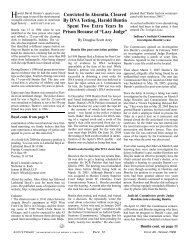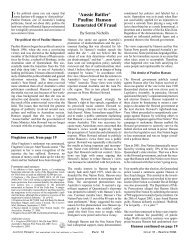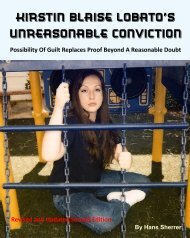Memorandum of Points and Authorities A. Preliminary - Justice Denied
Memorandum of Points and Authorities A. Preliminary - Justice Denied
Memorandum of Points and Authorities A. Preliminary - Justice Denied
You also want an ePaper? Increase the reach of your titles
YUMPU automatically turns print PDFs into web optimized ePapers that Google loves.
known to be such by representatives <strong>of</strong> the State, must fall under the<br />
Fourteenth Amendment . . .”).) Testimony need not constitute perjury<br />
for it to be false evidence. (In re Pratt (1999) 69Cal.App.4th 1294,<br />
1313-14 (“There is no requirement under the statute [Penal Code<br />
section 1473(b)(1)] that the defendant demonstrate that ‘testimony was<br />
perjured . . .’), quoting, In re Hall (1981) 30 Cal.3d 408, 424.)<br />
California law applies the same st<strong>and</strong>ard <strong>of</strong> materiality whether or<br />
not the prosecution had knowledge the testimony or other evidence<br />
14<br />
was false. (In re Pratt, 69Cal.App.4th at 1313-14 (“There is no<br />
requirement under the statute [Penal Code section 1473(b)(1)] that the<br />
14<br />
Under federal constitutional law, the st<strong>and</strong>ard <strong>of</strong> materiality<br />
differs depending on whether the prosecution had knowledge the<br />
testimony was false. If the prosecution “knew or should have known”<br />
the testimony was false, it is deemed material “if there is ‘any<br />
reasonable likelihood that the false testimony could have affected the<br />
judgement <strong>of</strong> the jury.” (Agurs, 427 U.S. at 103, 96 S. Ct. at 2397.) The<br />
Court in Agurs explained that this strict st<strong>and</strong>ard <strong>of</strong> materiality is<br />
appropriate in cases where the prosecution knew or should have<br />
known the evidence was false because such cases “involve prosecutorial<br />
misconduct” as well as “a corruption <strong>of</strong> the truth-seeking function <strong>of</strong><br />
the trial process.” (Agurs, 427 U.S. at 103, 96 S. Ct. at 2397.)<br />
The prosecution is deemed to have knowledge that evidence is<br />
false if any representative <strong>of</strong> the state, including police <strong>of</strong>ficers, has<br />
such knowledge. (Napue, 360 U.S. at 269 (“false evidence, known to be<br />
such by representatives <strong>of</strong> the State . . .”); In re Imbler (1963) 60<br />
Cal.2d 554, 566 (“If any representative <strong>of</strong> the state connected with the<br />
prosecution either gives perjured testimony or knows that other<br />
prosecution witnesses have perjured themselves, the writ [<strong>of</strong> habeas<br />
corpus] will issue.”)<br />
If the prosecution did not have knowledge the testimony was<br />
false, it is deemed material if “the false testimony could . . . in any<br />
reasonable likelihood have affected the judgment <strong>of</strong> the jury . . .”<br />
(Giglio v. United States (1972) 405 U.S. 150, 154, 92 S. Ct. 763, 31 L.<br />
th<br />
Ed.2d 104; Hall v. Dept <strong>of</strong> Corrections (9 Cir. 2003) 343 F.3d 976,<br />
982.)<br />
-48





